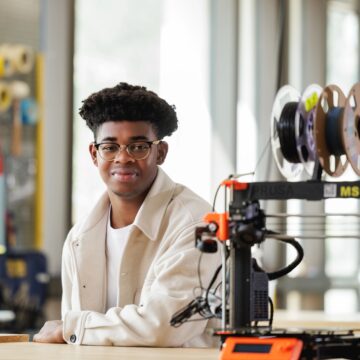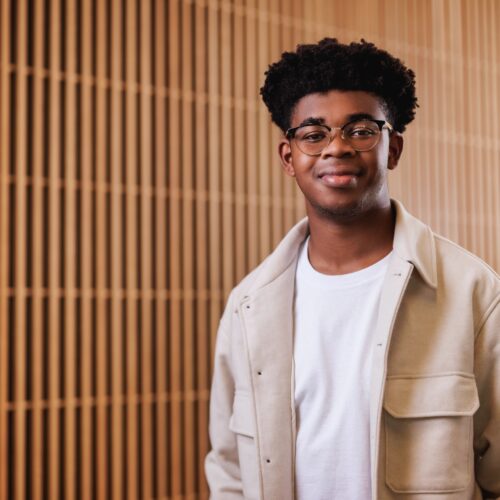As Chiby Onyeador tells it, he was sitting in his bedroom when his mom called him into the kitchen to take the phone. It was mid-February 2021, an unremarkable, sunny Los Angeles morning. All she said as she handed over the receiver was, “WashU’s calling.” Chiby recalls being a bit bewildered, “Why the heck is WashU calling?”

On the other end of the line, a man introduced himself and Chiby barely caught the name, “Bobick.” He listened in growing disbelief. At first, Chiby thought it was a WashU Admissions officer updating him on his application. By the end of the initial exchange, however, he learned that it was not merely an admission officer on the line. It was the dean of McKelvey School of Engineering calling directly to let Chiby know that he’d been selected as a Langsdorf Scholar. Chiby had just been awarded a full scholarship, should he decide to attend WashU, and Dean Bobick certainly hoped he would. As Chiby repeated the offer aloud, his mother broke out into raucous applause.
That February conversation has been instrumental to Chiby Onyeador’s path. A stellar high school student, Chiby had acceptances to a few of the Ivies already in hand. But, for him, Dean Bobick’s call was the first indication of a WashU difference. While the full-ride Langsdorf Scholarship was a huge boon, as Chiby puts it, “When it really boiled down to it, I realized I needed an institution where I could grow not only as a student but also as a person.” Dean Bobick’s call captured WashU as such a place—a university where students are known as individuals by name and by story.
“When it really boiled down to it, I realized I needed an institution where I could grow not only as a student but also as a person.”
Chiby Onyeador
When Chiby visited campus later that April, his perception of the WashU difference deepened. He had grown up in a strong public school district. The students were “cut-throat”- competitive and Chiby did not want to remain in that kind of context. It was still spring break and quiet during his first WashU tour, but Chiby took in the physical scene. He particularly noted the build-out of the new McKelvey Hall. It was wide open and full of collaborative workspaces. The physical plan itself encouraged teamwork. Chiby was sold on the possibilities of such an environment. He chose WashU.
Since his arrival in the fall of 2021, Chiby has been on fire. He is pursuing a double major in electrical engineering and systems engineering, as well as two minors in computer science and quantum engineering. He has pursued interdisciplinary skillsets beyond engineering too, taking advantage of the diverse opportunities that define WashU’s campus culture. For example, he joined Alpha Kappa Psi, a business fraternity, and formed some of his closest friendships. The group supports Chiby’s professional development beyond engineering skills and offers another avenue for collaboration outside the classroom. As Chiby describes it, AKP members message each other seeking input or encouragement on both personal and academic projects. They prioritize service and volunteerism, extending WashU’s commitment to community beyond campus.
Most important, Chiby has found that such support systems are not limited to student peers. Last term, he enrolled in Signals and Systems with Professor Jason Trobaugh. As Chiby recounts the rigor of the sequence, he states, “Even Professor Trobaugh would say the class is horrible! It’s really hard.” And it also happens to be a requirement for every electrical and systems engineering student. At the start of the term, Chiby found it easy to feel defeated in Signals. After countless hours of studying, he would still emerge with low quiz grades. Despite this, Trobaugh encouraged him. They met one-on-one; they discussed emergent patterns in problem-solving and how to reapply those solutions in different exam contexts. Three months later, Chiby completed the course with an A and a new, self-appointed major advisor: Jason Trobaugh. Here again, was the collaborative culture that drew Chiby to WashU.
There is no doubt this WashU ethos will continue to inform Chiby’s choices as he moves past college and into a career. Recently, he learned that the individual who funded his Langsdorf Scholarship was once a scholarship recipient himself some twenty years earlier. Chiby was genuinely moved and motivated by this discovery. Just as he has been primed for a future engineering career by WashU, he is likewise poised to give back to WashU.
Chiby says that learning about his own beneficiary as a former Langsdorf, “definitely just tells me that I want to give back … I’ve come to see the way we interact with the world can really shape the world around us. And I’m not sure if that’s completely unique to WashU alone, but certainly, the WashU community has prepared me for this.”
Your gift of any amount in support of WashU undergraduate scholarships will help the next generation of insatiably curious students pursue their passions and shape the future.
